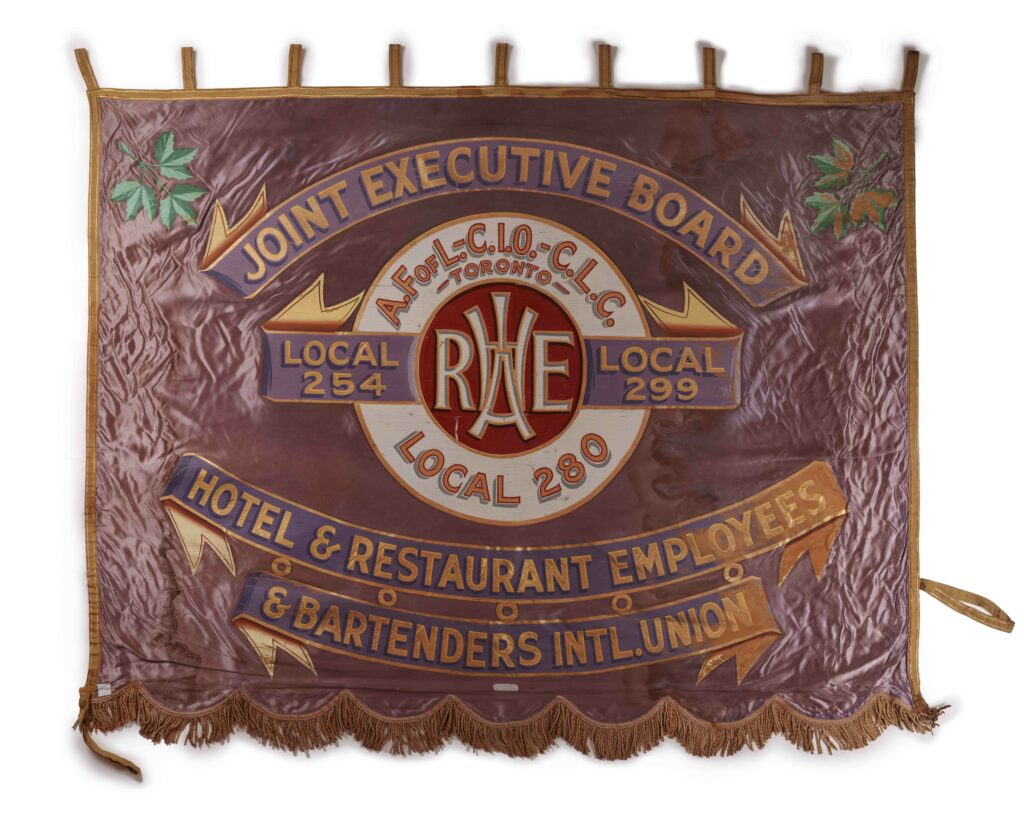Serving and bartending are not commonly thought of as being unionized professions. However, in the early to mid 20th century, this was not uncommon. In fact, in the early 1960s, service workers were at the forefront of one of Toronto’s most notorious strike actions.
The Waiters and Bartenders National Union was founded in 1891, and affiliated with the American Federation of Labor. The name was changed in 1898 to Hotel and Restaurant Employees International Alliance and Bartenders International League of America. In 1947, the name was changed again to Hotel and Restaurant Employees and Bartenders International Union.

Toronto’s International Beverage Dispensers and Bartenders Union Local 299 had its inaugural meeting on December 20, 1936, at which time it was called the Cooks Waiters and Waitresses International Local 299 (Uptown). It represented wait staff, kitchen staff, cleaners, porters, elevator operators, and other bar, restaurant and hotel staff.
Local 299 was involved in the bitterly fought 1961-1962 Royal York Hotel strike between the employer, the Canadian Pacific Railway, and its multi-ethnic, predominantly female membership. The main issues during negotiations were wages, and the employer seeking to reduce the recall notice after a layoff from 7 days to 48 hours.
“Royal York Strike Puts Guests To Work”
Cover of the Toronto Star, April 25, 1961
After negotiations between the employer and the union broke down, 1,200 staff members went on strike right before hotel dinner service but after the meal was prepared, leaving administrative staff to frantically carry out dinner service. Media headlines from the early days of the strike reported guests having to carry their own luggage, and other staff members filling the gaps while the hotel operated through the strike.
The Royal York Hotel was also able to keep operating during the strike by using a tunnel connecting Union Station to the hotel to bring in replacement workers without them crossing the picket line. Because striking workers could not keep replacement workers (known as “scabs”) from entering the building through the tunnel, they built public support for the strike by making the employer’s tactics known. 23 weeks into the strike, the Leader of the New Democratic Party, Tommy Douglas, addressed the strikers and showed his support.
On April 8th, 1962, a settlement between the union and the employer was reached. While unsuccessful, the strike did lead to the Ontario Supreme Court decision that workers not only had a right to strike, but also could not be fired while involved in a legal strike.

International Beverage Dispensers and Bartenders Union Local 299 is a predecessor of UNITE HERE Local 75, which was formed on June 1 1980, from a merger of Hotel and Club Employees Union Local 299 and Restaurant, Cafeteria and Tavern Employees Local 254.
Today, UNITE HERE Local 75’s diverse membership, across south central Ontario, includes many recent immigrants, and a high proportion of women. They represent workers in hotels, restaurants, racetracks and casinos, laundry and food service companies, airport concessions, and textile manufacturing. The union’s FairHotel program encourages consumers to support sustainable jobs in the hospitality industry, where workers have access to fair wages, quality healthcare, retirement benefits, and protection against harassment and discrimination.
Sources
Milloy, Jeremy. 2006. A Battle Royal: Service Work Activism and the 1961-1962 Royal York Strike. Labour/Le Travailleur, 58, 13–40.
The Toronto Workers’ History Project. June 8, 2021. Hotel Workers Rising: From the 1961 Royal York Hotel Strike to present day struggles. Facebook. https://www.facebook.com/TOWorkers/videos/958418741599091/
UNITE HERE Local 75 website. https://www.uniteherelocal75.org
FairHotel website. https://www.fairhotel.org
